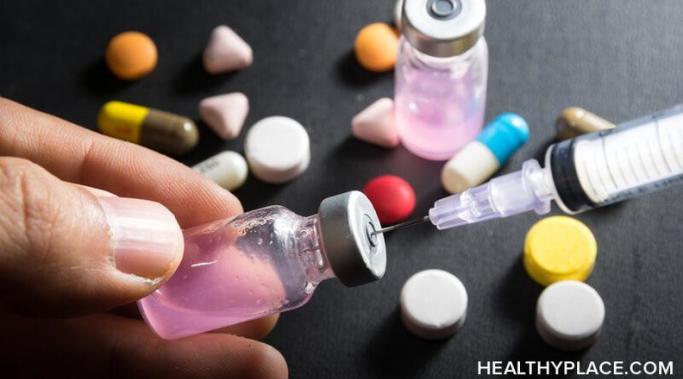Earlier this week I wrote a piece about being scared of trying antidepressants and as one commenter pointed out, there are increased risks associated with treating a person with bipolar with antidepressants. In fact, some would say that treating a bipolar person with antidepressants can worsen the course of the illness (always contraindicated as monotherapy and possibly undesirable altogether). Now, when I wrote the article I was only thinking of unipolar depressives, but, as one commenter pointed out, being diagnosed, correctly, with bipolar disorder, in itself, can be a challenge.
And this is absolutely true. Studies have found that it takes 5-10 years (from the time of the first episode) for a person with bipolar disorder to get an accurate diagnosis. There are many reasons for this, predominantly that people don’t get help when they have their first episode, but a major contributing factor is also misdiagnosis. People with bipolar disorder are often diagnosed with depression or schizophrenia first and this can have devastating outcomes.
Medication Side-Effects
I remember, before trying medication, I was terrified of it. I had the same misconceptions that many people do:
Medication is for weak people
Antidepressants are just “happy drugs” designed for people who can’t handle life
Medication will ruin your brain
Doctors give out antidepressants like candy whether you need them or not
As it turns out, none of these things are true, but they sure seemed true at the time.
So I get fear of antidepressants and other medication. Psych medication is scary stuff.
But sometimes you have to face that fear in order to get better.
There is an interesting, if perhaps disturbing, phenomenon in psychopharmacological drug treatment. It is the instance where a person initially has a satisfactory response to a medication, getting well, and perhaps staying well for years, only to have the illness come back at a random time in the future. The medication just “stopped” working. We have known about this for a long time with many drugs including antidepressants and anticonvulsants (mood stabilizers) and it’s sometimes referred to as antidepressant “poop-out” (I kid you not).
But this phenomenon goes against even the most basic understanding of medication, so why is it happening?
Recently, I was talking with someone on Twitter and she was concerned about the side effects of psychiatric medication X. I asked her what her starting dose was for the psych medication and she said 15 mg. Now, I’m not a doctor, but I can tell you two things:
That is ridiculous.
That will certainly make the patient stop the medication early due to side effects and never even find out if it works.
On Twitter a follower asked me about a specific side effect of a medication. She was considering taking the medication and was worried she might suffer from this side effect. This is a reasonable concern and it’s good that she’s researching the drug's effects and possible problems ahead of time.
But the thing is, while knowing about the possibilities is good, worrying about the possibilities is pretty useless. You won’t know if you will get the side effect unless you actually try the drug. The only way to know what is going to happen is to roll the dice.
Self-harm is mentioned below.
When I was at university earning my degree I was a busy girl. I was attending school full-time, working three part-time jobs and skydiving on the side. There wasn’t a lot of time for dilly-dally.
And, of course, through this I was also getting treatment for bipolar disorder. This was at a time when treatment has started becoming successful but we were still tweaking things to try and get the most from the medication. As most lab rats know, this means upping the dose.
And, one day, I was at work and suddenly found myself needing to excuse myself to the lady’s room so I could slice open my ankle.
Drat.
Last night I drank.
Alcohol.
OK. You probably don't need to alert the media. But I do need to alert you about the horrible effects alcohol can have on a person with bipolar disorder.
Yes, psychiatric drugs can cause weight gain. It's not a rumor; it's not a myth; it's true. It's one of the most unfortunate things about medication.
But what can you do about drug-related weight gain?
Last week we talked about five of the top things that we learned about mental illness last year:
Statistics on Prevalence of Bipolar Disorder
How often is Bipolar Diagnosis Mistaken for Depression?
Predictor of Bipolar Treatment Success
Antimanic Treatment Efficacy - Drugs Compared
Are Two Antidepressants Better Than One?
Today we will discuss 6-10 in part two of this article.
Sex is a basic human drive. We want to eat. We want to sleep. And we want to have sex. These are the things that bring us pleasure in life. Almost everything boils down to those three things.
But unfortunately, bipolar disorder and bipolar medication can affect all three. Bipolar disorder and its associated medication can make you eat. Or make you not eat. It can make you sleep. Or it can make you not sleep. And it can affect your sex life the same way.
But for some reason, doctors often take the effect on your sex life least seriously.

![MP900255362[1]](/sites/default/files/styles/blog_listing/public/uploads/2012/06/MP9002553621.jpg?itok=ccR4teIZ)
![MP900227837[1]](/sites/default/files/styles/blog_listing/public/uploads/2012/05/MP9002278371-124x180.jpg?itok=xgyGSOGl)



